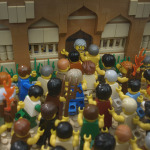Congregation Beth Mordecai
Congregation Beth Mordecai
An inclusive congregation affiliated with the Conservative Movement.
Your Jewish Home for the Soul!
An inclusive congregation affiliated with the Conservative Movement.
Your Jewish Home for the Soul!
February 13, 2015 By bethmordecai no comments.
 Parashat Mishpatim 2015/5775 (Triennial II) -- The Difficulty in Telling the Truth (Exodus 22:4-23:19)
Telling the truth is not always easy, but it's an important part of our society. Deals would not be made and promises would not be kept if we are worried the other side is lying to us. In this week's Torah portion (Mishpatim) we have an allusion to the act of telling the truth "before God" (Exodus 22:7) which may be a forebear to the testimonial act of swearing by use of a Bible. Perhaps this is meant to teach us that fear or love of God will cause us to tell the truth. Yet, embedded in the[...]
Parashat Mishpatim 2015/5775 (Triennial II) -- The Difficulty in Telling the Truth (Exodus 22:4-23:19)
Telling the truth is not always easy, but it's an important part of our society. Deals would not be made and promises would not be kept if we are worried the other side is lying to us. In this week's Torah portion (Mishpatim) we have an allusion to the act of telling the truth "before God" (Exodus 22:7) which may be a forebear to the testimonial act of swearing by use of a Bible. Perhaps this is meant to teach us that fear or love of God will cause us to tell the truth. Yet, embedded in the[...]
Category : Online Learning Online Parashah Class Tag : Elohim Elokim false gods God human Jewish judges mishpatim online learning online parashah class right testimony torah truth weekly torah portion witness wrong משפטים
January 31, 2015 By bethmordecai no comments.
 Parashat B'shalah 2014/5774 (Triennial II): Why Am I in the Middle?
At the end and the beginning of the triennial section of this week's Torah portion (Exodus 14:15 and Exodus 16:8), Moses finds himself standing between a complaining people and an impatient God. At first, Moses tries to intercede but later on he tries to get out of the way. Why the shift? What is different now about the relationships among God, Moses, and the Israelites that leads Moses to no longer want to be the middle man? And perhaps investigating this question will help us understand what to do when we are caught in the middle.
Join us for this interesting conversation on being caught in the middle.
Parashat B'shalah 2014/5774 (Triennial II): Why Am I in the Middle?
At the end and the beginning of the triennial section of this week's Torah portion (Exodus 14:15 and Exodus 16:8), Moses finds himself standing between a complaining people and an impatient God. At first, Moses tries to intercede but later on he tries to get out of the way. Why the shift? What is different now about the relationships among God, Moses, and the Israelites that leads Moses to no longer want to be the middle man? And perhaps investigating this question will help us understand what to do when we are caught in the middle.
Join us for this interesting conversation on being caught in the middle.
Category : Online Learning Online Parashah Class Tag : b'shalah beshallach caught God intermediary Israelite people middle moses online parsha class online parshah class parsha parshat relationship torah weekly torah portion בשלח
January 23, 2015 By bethmordecai no comments.
 Parashat Bo 2015/5775 (Triennial II) -- The Jewish Origin for Counting Time (or JST, Jewish Standard Time)
This week we celebrated the new Jewish month (hodesh) of Sh'vat in which we will celebrate the "New Year of the trees" (to take place in the middle of the month). While counting months of a year seems natural, it was in many ways an innovation at a time when the year was organized strictly by the sun. In this week's Torah portion, we read this moment of innovation in which God commands Moses and Aaron to appoint "this month as the head of all months" (Exodus 12:1-2). What does this innovation teach us about the unique way in which God wanted the Israelites[...]
Parashat Bo 2015/5775 (Triennial II) -- The Jewish Origin for Counting Time (or JST, Jewish Standard Time)
This week we celebrated the new Jewish month (hodesh) of Sh'vat in which we will celebrate the "New Year of the trees" (to take place in the middle of the month). While counting months of a year seems natural, it was in many ways an innovation at a time when the year was organized strictly by the sun. In this week's Torah portion, we read this moment of innovation in which God commands Moses and Aaron to appoint "this month as the head of all months" (Exodus 12:1-2). What does this innovation teach us about the unique way in which God wanted the Israelites[...]
Category : Online Learning Online Parashah Class Tag : bad bo change good months online learning online parashah class parsha parshah time weekly torah portion בא
January 16, 2015 By bethmordecai no comments.
Parashat Va-era 2015/5775 (Triennial II): Egyptian Magicians and The Finger of God In the second third of this week's Torah portion (Exodus 7:8-8:15), we read of four instances in which Moses and Aaron demonstrate the power of God -- through turning a rod into a snake (Exodus 7:8-10), changing the water of the Nile to blood (Exodus 7:17-21), spreading frogs throughout the land (Exodus 7:27-8:2), and creating lice from the dust of the earth (Exodus 8:12-13). In the first three instances, Egyptians magicians (hartumei mitzrayim) are able to replicate the miracles that Moses and Aaron demonstrate (Exodus 7:11-12; 22; 8:3). However, when they fail to replicate the fourth miracle/plague (i.e. the lice) they proclaim to Pharaoh that "this is the finger[...]
Category : Online Learning Online Parashah Class Tag : online learning online parashah class weekly torah portion
By bethmordecai no comments.
 2015/5775 Parashat Sh'mot (Triennial II) -- And The Bush Was Not Consumed
In this week's parashah, we encounter the famous moment in which Moses meets God by way of a "bush all aflame, yet the bush was not consumed" (Exodus 3:2). This symbol of the burning bush was adopted by Solomon Schechter, the first great chancellor of the Jewish Theological Seminary (JTS), to be the symbol of the institution known as the scholarly fountainhead of Conservative Judaism. For today's class, we will use the insights of JTS rabbis (and the commentaries they bring) to understand the value of this symbol today.
Please join us or watch at your convenience!
Classes from other[...]
2015/5775 Parashat Sh'mot (Triennial II) -- And The Bush Was Not Consumed
In this week's parashah, we encounter the famous moment in which Moses meets God by way of a "bush all aflame, yet the bush was not consumed" (Exodus 3:2). This symbol of the burning bush was adopted by Solomon Schechter, the first great chancellor of the Jewish Theological Seminary (JTS), to be the symbol of the institution known as the scholarly fountainhead of Conservative Judaism. For today's class, we will use the insights of JTS rabbis (and the commentaries they bring) to understand the value of this symbol today.
Please join us or watch at your convenience!
Classes from other[...]
Category : Online Learning Online Parashah Class Tag : bush conservative judaism consumed exodus JTS online learning online parashah class sh'mot solomon schechter weekly torah portion
December 19, 2014 By bethmordecai no comments.
Parashat Mikeitz 2014/5775 (Triennial II) -- Hope Amidst Destruction In this week's Torah portion we learn about the stories related to the rationing ("shever") of grain in Egypt by our forefather Joseph. The Hebrew word "shever" is used often in this context, principally to refer to the dividing of grains into rations. Yet in other contexts the same root (sh-v-r) means "to destroy" and an analogous root (s-v-r) means "to hope." What can we learn by the different meanings of the same root? Given the dire circumstances caused by the famine in Egypt, is it possible that the act of "rationing" is a reflection of hope amidst destruction? And if so, what role can God play in helping us have hope through the tribulations[...]
Category : Online Learning Online Parashah Class Tag : brothers destruction hope joseph mikeitz miketz online learning online parashah class parsha parshah weekly torah portion מקץ
November 14, 2014 By bethmordecai no comments.
 Parashat Hayyei Sarah 2014/5775 (Triennial II) -- Shalshelet: Making God's Presence Present
One of the most unique "trope" (cantillation) marks in the Torah is the "Shalshelet" -- a squiggly line that looks like a thunder bolt. This trope mark only appears four times in the Torah (seven times in the Bible), including in this week's Torah portion (Genesis 24:12). What is so unique about the Shalshelet and what is it trying to teach us?
Join us for this fascinating class as we see how the Shalshelet helps us understand the nature of God's presence in the world.
Photo taken from http://arts.brighton.ac.uk/stibbe-handbook-of-sustainability/additional-chapters/critical-and-reflective-thinking
Parashat Hayyei Sarah 2014/5775 (Triennial II) -- Shalshelet: Making God's Presence Present
One of the most unique "trope" (cantillation) marks in the Torah is the "Shalshelet" -- a squiggly line that looks like a thunder bolt. This trope mark only appears four times in the Torah (seven times in the Bible), including in this week's Torah portion (Genesis 24:12). What is so unique about the Shalshelet and what is it trying to teach us?
Join us for this fascinating class as we see how the Shalshelet helps us understand the nature of God's presence in the world.
Photo taken from http://arts.brighton.ac.uk/stibbe-handbook-of-sustainability/additional-chapters/critical-and-reflective-thinking
Category : Online Learning Online Parashah Class Tag : chayei sarah God hayyei sarah presence shalshelet torah Trope
November 7, 2014 By bethmordecai no comments.
 Parashat Vayera 2014/5775 (Triennial II) -- Raping Foreigners
In this week's Parashah, we read how the men of Sodom came to Lot's home to demand that he release the men staying in his home so "v'neid-ah otam, so that they can rape them (Genesis 19:5). This trope of raping foreigners is echoed later in the Bible in Judges 19:22. Why are the men in both of these stories doing this to the foreigners in their midst? What can these stories teach us about the power of rape and attitudes to foreigners? Do these stories have anything to teach us today?
Classes from other years:
Parshat Vayera[...]
Parashat Vayera 2014/5775 (Triennial II) -- Raping Foreigners
In this week's Parashah, we read how the men of Sodom came to Lot's home to demand that he release the men staying in his home so "v'neid-ah otam, so that they can rape them (Genesis 19:5). This trope of raping foreigners is echoed later in the Bible in Judges 19:22. Why are the men in both of these stories doing this to the foreigners in their midst? What can these stories teach us about the power of rape and attitudes to foreigners? Do these stories have anything to teach us today?
Classes from other years:
Parshat Vayera[...]
Category : home Online Learning Online Parashah Class Tag : foreigners Genesis 19:5 home Judges 19:22 land online learning online parashah class power ramban rape sanhedrin sanhedrin 109a strangers talmud vayera weekly torah portion וירא
November 6, 2014 By bethmordecai no comments.
Parashat Lekh L'kha 2014/5775 (Triennial II): God Has to Show Up (The Covenant Between the Pieces) In this week's parashah, we learn of the "covenant between the pieces" in which "a smoking oven" and "flaming torch" appear between divided pieces of sacrifices made by Abraham (Genesis 15:17). In the imaginations of the rabbis this is a representation of God as if to say that God appears before Abraham (in his dream) to make a covenant with him. What is unique about this appearance of God? What can it teach us about how God is supposed to appear in our lives and the nature of our relationship with God? Classes from other years: Online Learning Online Parashah Class Tag : covenant God land online parashah class promise relationship weekly torah portion
October 24, 2014 By bethmordecai no comments.
 Parashat Noah Triennial II (2014/5775) -- God's Heart
In this week's Torah portion, God uses a flood to destroy all living beings except for Noah and all of the creatures stowed safely in his ark. Afterwards God resolves to never again destroy humanity through a flood, but God's decision only comes about after "God spoke to God's heart" (Genesis 8:21). Is it possible for God to physically have a heart? If so (or even if it's a metaphor) what is significant about God speaking to God's heart and can it teach human beings something about our own hearts?
Join us for this fascinating class as we learn about God's heart and the gift of our[...]
Parashat Noah Triennial II (2014/5775) -- God's Heart
In this week's Torah portion, God uses a flood to destroy all living beings except for Noah and all of the creatures stowed safely in his ark. Afterwards God resolves to never again destroy humanity through a flood, but God's decision only comes about after "God spoke to God's heart" (Genesis 8:21). Is it possible for God to physically have a heart? If so (or even if it's a metaphor) what is significant about God speaking to God's heart and can it teach human beings something about our own hearts?
Join us for this fascinating class as we learn about God's heart and the gift of our[...]
Category : Online Learning Online Parashah Class Tag : acceptance destruction God God's love endures forever heart humanity Noah online learning online parashah class physical rainbow sacrifices נח